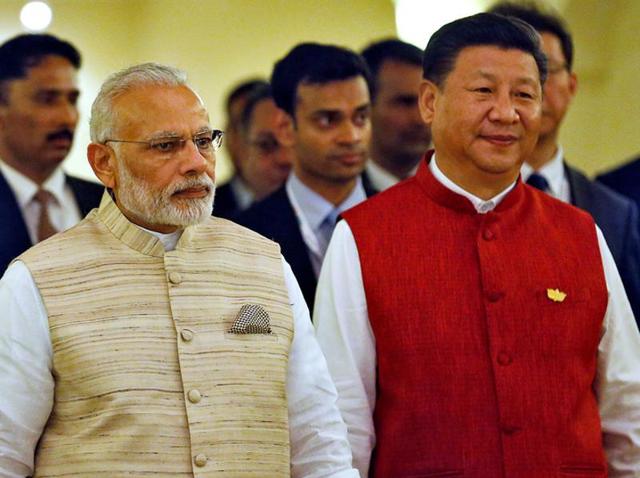BRICS covers ground on terror, but outcome may have fallen short of Modi’s hope
The five-nation BRICS grouping may have endorsed the strongest ever statement on terrorism but diplomacy observers are not sure if the outcome matched the hope that Prime Minister Narendra Modi had raised through a forceful pitch on the issue.
The five-nation BRICS grouping may have endorsed the strongest ever statement on terrorism but diplomatic observers are not sure if the outcome matched the hope that Prime Minister Narendra Modi had raised through a forceful pitch on the issue.

The Goa Declaration, adopted at the end of the summit in Goa on Sunday, mentioned terrorism 24 times and was more elaborate than past declarations in addressing specific aspects of terrorism. But New Delhi’s effort to nail Pakistan and terror groups based in the neighbouring country with a mention of “cross-border terrorism” failed to secure a consensus.
“Each country is filtering the issue of terrorism through its immediate objectives and what it sees as its own challenges. When you start aggregating things, the specificity of terrorism becomes complex, especially for arriving at a consensus,” said C Uday Bhaskar, director of the Society for Policy Studies, a New Delhi-based think tank. “You shouldn’t set a goal that isn’t feasible.”
The declaration named the Islamic State, Jabat al-Nusra, the Syrian Islamist rebel group that recently rebranded itself as Jabhat Fatah al-Sham, and other UN designated terror groups but didn’t call for action against Pakistan-based terror groups such as the Jaish-e-Mohammed which New Delhi holds responsible for last month’s militant attack in Uri that left 19 soldiers dead.
“I guess it doesn’t concern all the BRICS countries. Perhaps, that’s why we couldn’t get a consensus on naming these groups,” said Amar Sinha, India’s chief negotiator at the summit.
Underlining India’s challenges on the issue, China on Monday described Pakistan as an “all-weather friend” and said it was against linking any country to terrorism.
In a sharp counter to Modi’s charge against Islamabad, China also said that Pakistan has made “great sacrifice to combat terrorism and this needs to be recognised by the international community”. This view, in effect, makes both India and Pakistan victims of terrorism, which is not what Modi meant when he described Islamabad as the “mother ship of terrorism”.
Russia shares New Delhi’s concerns but it has lately been seeking to add a strategic dimension to its relations with Islamabad.
On Sunday, Chinese President Xi Jinping used “stronger words” to condemn terrorism but also emphasised on the need to find “political solutions to regional hotspots” and address the “root causes” -- an apparent reference to Kashmir.
On Saturday, Modi was unsuccessful in nudging Xi to support India’s call for the UN designating Masood Azhar, the chief of Jaish-e-Mohammed, as a terrorist. Beijing had blocked India’s move for the second time last month, saying it needs to see adequate evidence and a proper process followed.
“This underscores how difficult it is going to be for India to get China on its side on Pakistan and cross-border terrorism,” said C Rajamohan, director at research body Carnegie India.
That said, despite its support to Pakistan, China agreed to a significant addition to BRICS declaration in Goa, that a country is responsible for terrorism emanating from its soil.
“China may not go as far as we would have wanted it to go, but there has been a progressive shift,” said Ajai Sahni, executive director of the Institute for Conflict Management.
Others see Modi’s decision to make terrorism a core issue at the summit as a move that backfired.
“Ultimately, what did India get out of its Pakistan-centric campaign?”asked MK Bhadrakumar a former diplomat. “The declaration said nothing on cross-border terrorism or state-sponsored terrorism.”
Sunday’s huddle of BRICS leaders began with the Indian Prime Minister launching a scathing attack on Pakistan, without naming the neighbour, and calling it the “mother ship of terrorism…linked to terror modules across the world”.
Later, at the plenary session of the BRICS summit, Modi said “selective approaches to terrorist individuals and organisations” would not only be futile but also counter-productive.
His forceful call for action against Pakistan, however, failed to resonate with other leaders, most of whom refrained from talking about terrorism when their turn to speak came. Instead, they chose to speak on the core agenda of greater economic and development cooperation among BRICS countries.
Pakistan was quick to take a jibe at India.
“Pakistan joins all the members of BRICS and BIMSTEC in condemning terrorism and reaffirms its full commitment to fight the menace of terrorism,” said Sartaj Aziz, foreign affairs adviser to PM Nawaz Sharif.
Aziz described Modi’s statement as misleading and a desperate attempt to hide “India’s brutalities” in Kashmir.
“By frontloading Pakistan-sponsored terrorism with BRICS, India lost a rare opportunity to showcase our country as an emerging power and aspiring permanent member of the UNSC,” said Bhadrakumar. “We have created a credibility problem from ourselves.”
(Jayanth Jacob contributed to this analysis)





